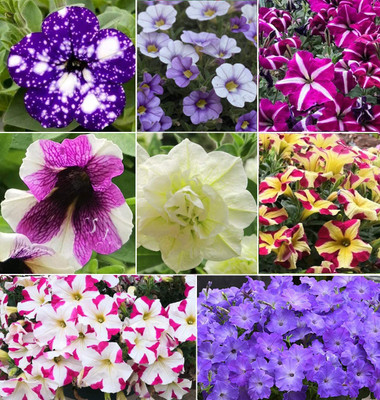CYBEXIS Petunia Hanging Flower Seeds Dwarf Seed(50 per packet)
Quick Overview
Product Price Comparison
Petunia is a type of flowering plant that belongs to the family of nightshades.There are 35 species of petunia that originate from South America. Petunias are low-growing, bushy to spreading tender perennials usually grown as annuals. Their soft, thick leaves are slightly sticky to the touch. Trumpet-shaped flowers have a single set of plain-edged petals, or can be doubled, ruffled, or fringed and come in colors from light pink through dark red, and pale blue through deep purple. Petunia cultivates in areas that provide at least 5 to 6 hours of sun per day, on a well-drained, fertile soil. It doesn't tolerate frost. Petunias are cultivated because of their ornamental flowers that are available in variety of colors and shapes. Whether in hanging baskets or containers on tables or a front porch, growing petunias in pots brings out vibrant color throughout the summer to whatever area you choose.PLANTING INSTRUCTIONSSoil should be collected in a garden pot mixed with well rotten cow dung or manure.Broadcast the seeds over the soil bed and cover it with a thin layer of sieved sand to allow germination.Maintain a distance of 1.0 feet between the plants.Sprinkle little water and then as per requirement keeping the soil moist.Flowering starts after 45-50 days post transplant which continues for 100-120 days depending on the variety.GROWING REQUIREMENTSPESTSMarigolds are susceptible to damping off (Rhizoctonia solani) and pests like collar rat, Sclerotium rolfsii, Botrytis cinerea, Powdery mildew and cucumber mosaic. The major symptom for these pests is light brown spots on the lower leaves or on early seedlings. To prevent these diseases, ensure proper drainage and ventilation and avoid over watering.SOILSandy loamy soil with pH 5.6 to 6.5 is ideal for its cultivation.SPOTPlace in a spot that receives either full sun or partial sunlight.TEMPERATURE20-25┬░CWATERINGRegular watering keeps the flowers healthy. You can use a water can or a water spray.HOW TO HARVESTFor harvesting marigold, loose flowers are plucked when they attain full size depending upon the variety. Flowers should generally be harvested in the morning hours. Irrigation of soil with water,before plucking, gives better flower quality. Also, plucking of flowers regularly and removal of dried flowers enhances the yield.


